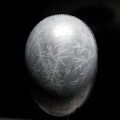Spin ice (nonfiction): Difference between revisions
No edit summary |
|||
| (9 intermediate revisions by the same user not shown) | |||
| Line 3: | Line 3: | ||
It has "spin" degrees of freedom, i.e., it is a magnet, with frustrated interactions that prevent it from completely freezing. | It has "spin" degrees of freedom, i.e., it is a magnet, with frustrated interactions that prevent it from completely freezing. | ||
Spin ices show low-temperature properties, residual entropy in particular, closely related to those of crystalline water ice. | Spin ices show low-temperature properties, [[Residual entropy (nonfiction)|residual entropy]] in particular, closely related to those of crystalline water ice. | ||
The most prominent compounds with such properties are [[dysprosium titanate (nonfiction)]] and holmium titanate. | The most prominent compounds with such properties are [[dysprosium titanate (nonfiction)]] and holmium titanate. | ||
| Line 13: | Line 13: | ||
== In the News == | == In the News == | ||
<gallery | <gallery> | ||
File:Nobel Ice (Fabergé egg).jpg|Fabergé egg | File:Nobel Ice (Fabergé egg).jpg|link=Dysprosium Titanate|[[Gem detective (nonfiction)|Gem detective]] alert: [[Fabergé egg (nonfiction)|Fabergé egg]] recently commissioned by [[Dysprosium Titanate]] made from Spin Ice, may be trap for [[Roger Zelazny]]. | ||
File:Gnotilus-fighting-Heracles.jpg|link=Gnotilus|[[Gnotilus]] has an unlucky habit of slipping and falling on | File:Gnotilus-fighting-Heracles.jpg|link=Gnotilus|[[Gnotilus]] has an unlucky habit of slipping and falling on Spin Ice. | ||
Brion_Gysin.jpg|Brion Gysion uses | Brion_Gysin.jpg|Brion Gysion uses [[scrying engine]] to preview [[Gnotilus]] slipping on Spin Ice. | ||
</gallery> | </gallery> | ||
| Line 22: | Line 22: | ||
* [[Dysprosium Titanate]] | * [[Dysprosium Titanate]] | ||
* [[Gnomon algorithm]] | |||
* [[Gnomon Chronicles]] | |||
* [[Gnotilus]] | * [[Gnotilus]] | ||
* [[Scrying engine]] | * [[Scrying engine]] | ||
| Line 30: | Line 32: | ||
* [[Gem detective (nonfiction)]] | * [[Gem detective (nonfiction)]] | ||
* [[Geometrical frustration (nonfiction)]] | * [[Geometrical frustration (nonfiction)]] | ||
* [[Residual entropy (nonfiction)]] - the difference in [[Entropy (nonfiction)|entropy]] between a non-equilibrium state and crystal state of a substance close to absolute zero. This term is used in condensed matter physics to describe the entropy at zero kelvin of a glass or plastic crystal referred to the crystal state, whose entropy is zero according to the third law of thermodynamics. It occurs if a material can exist in many different states when cooled. The most common non-equilibrium state is vitreous state, glass. | |||
External links: | External links: | ||
Latest revision as of 03:31, 2 December 2019
A spin ice is a substance that does not have a single minimal-energy state.
It has "spin" degrees of freedom, i.e., it is a magnet, with frustrated interactions that prevent it from completely freezing.
Spin ices show low-temperature properties, residual entropy in particular, closely related to those of crystalline water ice.
The most prominent compounds with such properties are dysprosium titanate (nonfiction) and holmium titanate.
The magnetic ordering of a spin ice resembles the positional ordering of hydrogen atoms in conventional water ice.
Recent experiments have found evidence for the existence of deconfined magnetic monopoles in these materials, with analogous properties to the hypothetical magnetic monopoles postulated to exist in the vacuum.
In the News
Gem detective alert: Fabergé egg recently commissioned by Dysprosium Titanate made from Spin Ice, may be trap for Roger Zelazny.
Gnotilus has an unlucky habit of slipping and falling on Spin Ice.
Brion Gysion uses scrying engine to preview Gnotilus slipping on Spin Ice.
Fiction cross-reference
Nonfiction cross-reference
- Dysprosium titanate (nonfiction)
- Gem detective (nonfiction)
- Geometrical frustration (nonfiction)
- Residual entropy (nonfiction) - the difference in entropy between a non-equilibrium state and crystal state of a substance close to absolute zero. This term is used in condensed matter physics to describe the entropy at zero kelvin of a glass or plastic crystal referred to the crystal state, whose entropy is zero according to the third law of thermodynamics. It occurs if a material can exist in many different states when cooled. The most common non-equilibrium state is vitreous state, glass.
External links:



